#ok. little gay coded homosexual boy
Text






#dustin finding fairy wings in the costume bin. cut to mike putting makeup on el#ok. little gay coded homosexual boy#no one hate crimes him in s3 probably bc he's spending all of his energy actively avoiding it#at least in s4 he reclaims bambi for himself#character development <3#mikesbasementbeets posts
104 notes
·
View notes
Text
incorrect quotes ?
based on my friends groups quote book:
~~~~~
Jack: “War is just next level bullying” (Pulitzer interaction coded haha)
~~
Someone(idk ok?): “I’m proud to be normal”
Race: “IM SORRY YOURE BASIC”
~~
Albert: “Mass Murder is ok”
~~
Race(losing at uno): “you’re so… unamerican!”
(fun fact the context behind this was our principal losing at uno to me and a friend)
~~
Davey: “Dad can I have a few friends over to take on |the newspaper|” (original quote was the Canadian Coast Guard)
~~
Race: “you may be fruity, but you ain’t a snack”
~~
Pulitzer: “go away you homeless hallucination”
~~
Albert: “that statement makes me want to become homophobic”
~~
Katherine: “I just really like women”
~~
Albert: “I’ll gouge your eyes out and shove them down your throat…. Mmmm boba!”
~~
Race; “every seconds a hot second of you look nice enough.”
~~
Specs: “Romeo is that even a burger?”
Romeo: “it is a burger it’s just got 19 patties.”
Elmer: “wha- why?”
Romeo: “I’m a hungry little boy”
Buttons: “ ITS THIRTY DOLLARS ROMEO!”
(I witnessed this 😔)
~~
Les: “You’re not gay???”
Davey: “….no?..”
Les: “But I was an ally, man! Now I’m forcing you to be gay like everyone else.”
~~
Davey: “I don’t like men!…. Ok when you look at me with those eyes maybe I do.”
~~
Specs: “Australia doesn’t exist, Romeo.”
Romeo: “yes it does??”
Specs: “no. DAVEY! Australia doesn’t exist right?”
Davey(sighing): “Yea,”
~~
Sarah: “I hate to break it to you but men……no”
~~
Oscar Delancy: “No electric pencil sharpener? That’s homosexual.”
~~
Spot: “you know when I’m angry I like to say I’m going to commit war crime in |manhattan| and I think that’s a healthy coping mechanism.”
~~
Les(looking at pride flags): “I’ve been to all those places.”
David: “are you sure?”
Les(pointing at bi flag): “I’ve been there”
~~
Jack: “you heard it here guys! Axe body spray is the #1 cause of marriage.”
~~
Hannah: “I’m a good person I swear! I just mildly support child labor”
~~
Race: “you’re alone in my room and I take out my |harmonica| and start playing careless whisper.”
~~
Race: “do you feel picked on, harassed, unloved? Good, then my work here is done.”
~~
Sarah: “you’re embarrassed because you like men, and you absolutely should be.”
~~
Specs: “you thought Germany was part of Britain.”
~~
Romeo: “Call me America the way I be spying.”
~~
Davey: “How do you sell your mom for a pack of cigarettes?”
Race: “they were cigars, coronas actually.”
Davey: “they were lung cancer”
~~
I’m so sorry for how long this is, the quote book is a year or so old by now
#newsies#newsies broadway#newsies musical#jack kelly#newsies 1992#92sies#david jacobs#broadway#les jacobs#racetrack higgins#Quotes#incorrect quotes#romeo newsies#specs newsies#buttons newsies
24 notes
·
View notes
Text
Okay so here's a badly explained explanation of the gay meta rvd ending
so Louisa may Alcott wrote little women and she didn't want to make Jo end up with a man but her editors were like girl you have to so last chapter is a added piece of heteroseuxal propaganda purposes
Anyway in Dawson's creek last two eps are Dawson the author of Dawsons creek own tv show based of his own life that is also bizarre and weird and plot has a lot of little women girls endings happening like Polly's meg ending
Last ep we got the song tell me at the end of ep which was sung by sarosie Ronan aka jo march of the Greta gerwig little women and let's look at this
So here's gerwigs Jo march speech

And here's Alice and Betty in the ep before this
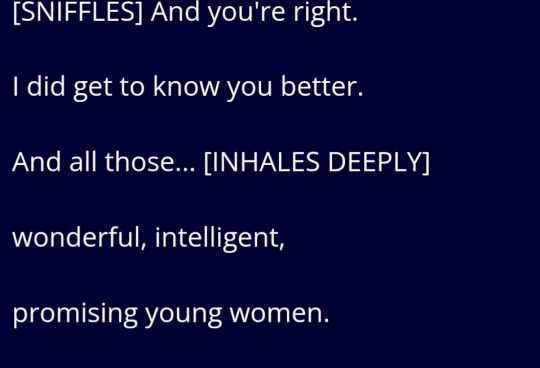
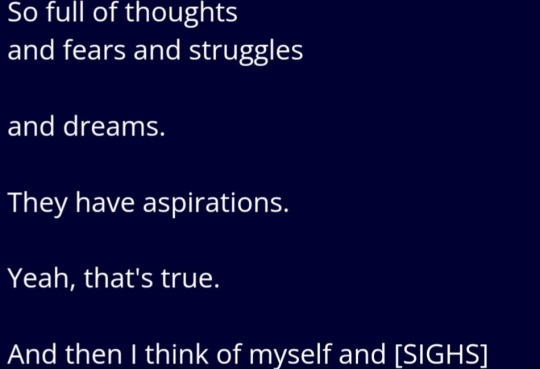

It's the same sentiment
Ok so in rvd series finale we are watching jug and Betty the authors of rvd(joey potter is also author in Dawson's creek) like visit the gang in like a Christmas carol esc dreamscape
so what's happening is we are Jug's novel version of the life of the Riverdale kids but this time it's slaps isn't bad or lazy like jugs first novel about the serpents
Betty and jug both have magazines something I presume is true in some way in the irl universe but jug makes Betty the main character because she's the only who like has her bad memories and she's a author and his platonic soulmate bla bla bla
So I think that irl bughead gay siblings probably said a lot of what is in the this ep but also Archie's poem is full of things that happened irl in rvd that are bad memories so clearly jughead or Betty had to write it
Betty who I've said like thirty times is also a rvd author saids a different version of jugs Riverdale's goodbye speech that is reminiscent of Archie's earlier poem
The polycule is something jug wouldn't directly be involved in a sexual manor(at least with Archie) irl he's got issues with his homosexuality but remember hes sees beronica as a part of himself so adding in beronica gay sex while still making it hetero sensationalized idea of sexuality via the polycule thing is a great solution also here's Jen from Dawson's creek words on their core four
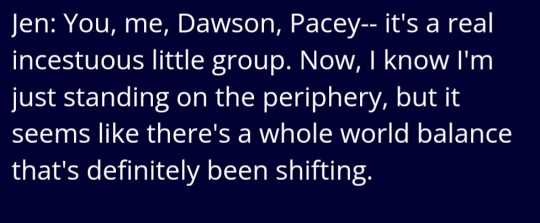
She's calls it incestous so I highly doubt the polycule is like a good thing
Also the reason jarchie isn't really declared is because jarchie is Dawson and pacey and they already got they're gay ending in Dawson's Creek the white boys already got their ending (like in gay coded media history legacy etc)
The show is centered around obviously our authors but also Veronica our latina party girl from new York so the idea that beronica is confirmed but not jarchie because bless their hearts but Archie doesn't make poetry that's groundbreaking and just lacks emotional delveopment and jughead is pathetic but often times correct but primarily out of the necessity of childhood survival stragies and jug is obsessed with his man so naturally arch is portrayed as the bees knees
Sidenote:if you wanted to you could breakdown every detail that's close to what happened irl or is something jug is extrapolating on in his novel for example we know Cheryl is painter and so Jughead gives her a career as painter
Anyway tldr it's Louisa may Alcott core gay
#Riverdale#jarchie#beronica#betty cooper#veronica lodge#jughead jones#archie Andrews#betty x veronica#veronica x betty#archie x jughead#jughead x archie
10 notes
·
View notes
Text
Fucking making Dorian Gray about Yugioh because why the fuck not. It's my blog I do what I want. Welcome to tumblr dot com.
This is long as hell and kind of convoluted. Click read more if you want to hear my rambling thoughts about about queer coding, language, and censorship, within the context of comparing the classic work of late 1800s literature The Picture of Dorian Gray, a work credited with loosening the grip of the pervasive and stifling Victorian morals, written by Oscar Wilde, who was famously tried for gross indecency because he was gay and this was considered a threat to society, and the 4kids dub version of Yugioh, first aired on children's television networks in the early 00s over a century later, and famously censored to make regular facts of life, such as death, more terrifying in order to make the show "suitable for children" and "suitable for network TV."
Ok. So. It's chapter two. Dorian Gray has just objected to being called "boy," to which Lord Henry says something like "you know you want it."
Specifically on p. 104-105
"And I don't allow anyone to call me a silly boy."
[...]
"And you know you have been a little silly, Mr. Gray, and that you don't really mind being called a boy."
"I should have minded very much this morning, Lord Henry."
"Ah! this morning! You have lived since then."
The significance of this objection, according to the annotations, is that to call another man a "boy" "was frequently understood as a veiled announcement of homosexual or homosocial desire." (p 105) The annotations provide Lord Alfred Douglas' nickname "Bosie" as evidence. (Lord Alfred Douglas was Oscar Wilde's lover, and his father is the one who's charges eventually put Oscar Wilde in jail.)
Lord Henry is, quite frankly, being quite creepy here. "I don't want this." "Oh but you do." 🤮 [If I had a quarter for every time I had a conversation that went like that...]
Even before the 1891 book version, Lord Henry can't really be seen as a good influence on Dorian Gray. At best he is an amoral influence, as he's said himself, but it's quite clear from his own thoughts that he doesn't really believe that. (Earlier: "Lord Henry watched him[Dorian Gray], with his sad smile. He knew the precise psychological moment when to say nothing." p. 97) He's been screwing with Dorian the whole time. And sure, there is language to assert that the ideas that Lord Henry espouses (which are many, and quite contradictory) merely awaken something already within Dorian Gray, it is still clear that Lord Henry is meaning to be manipulative.
This is further evidenced by annotation number 22 on page 97.
Lord Henry brings a combination of intellectual detachment and pleasure to the task of influencing Dorian that is positively Mephistophelian in its connotations. Later, he will refer to Dorian as his "own creation." Lord Henry knows that there are moral consequences to the advice he gives Dorian, but he finds "an exquisite pleasure in playing on the lad's unconscious egotism." There has been much critical speculation about what motivates the combination of pleasure and detachment -- about whether it is a sublimated expression of erotic desire, whether it has a purely philosophic or pedagogic basis, or whether it is a sign of Lord Henry's own moral corruption.
It is clear, however, from all the context of the annotations and the words on the page themselves, at least, that Lord Henry makes Dorian Gray uncomfortable, and likely made the audience uncomfortable as well.
Especially when the rationality for the discussion above harkens back to the Cleveland Street Scandal of 1889, which was still very much in the public consciousness. (Wilde's manuscript was published in Lippencott's magazine in July of 1890.) The link is to wikipedia, because I'm only going to allude to the social impact of the scandal here. Go ahead and read it if you want more information.
Anyway, this brings me to Yugioh, and the (Dub portrayal) of this man:

I'm going to have to take a few steps back because I want to talk about Pegasus as queer coded villain, because I think that flipping from the Cleveland Street Scandal to the character of Maximilian Pegasus is not super obvious.
Disclaimer, this is obviously all opinion. While I'm relying heavily on scholarly annotations regarding Dorian Gray, with Yugioh I can't even claim to have a very informed opinion outside of being in fandom and watching it with my eyes. Also, I lived during its historical context. But, I've never taken a media studies or GWSS class.
That being said... to me, Pegasus' queer coding all comes down to his voice and his vocal tics. Here:
To me, the more obvious way that Pegasus is queer coded is the sing-songy lilt in his voice, which is not dissimilar to the stereotypical valley girl speech that was often assigned to gay men by bullies at my school in popular culture at the time. This could be written off as an English language interpretation of a vocal tic... especially since he has a vocal tic in the original Japanese that would be hard to translate and also sounds sort of similar.
youtube
I do not know enough about Japanese culture to comment on whether this verbal tic from the original anime had any queer connotations whatsoever. I can't even say that the creative choices made by 4kids were a bad way to represent Pegasus' Japanese actor's voice in English, and I certainly can't speak to their intent regarding the perception of Pegasus' character. I can only say what connotations I as a viewer brought with me to this creative choice.
Regardless, Yugioh was being aired in the United States divorced from its original context, and heavily censored. So, if the audience has a connotation about the way Pegasus talks.... the audience has this connotation. The resources to look for why this choice might have been made weren't meant to be available to US viewers in the 00s. I had them right after my viewing because I didn't watch Yugioh until I was an adult, sometime around 2015.
Back to the lilt. Obviously Pegasus isn't meant to be gay in the "falls in love with other guys" sense. The story gives him a female love interest, who dies. This motivates him to get the Millennium Eye and "become evil" because it's a 00s era kid's show and we only get extremely cut and dry morality, so characters are usually either good or evil. (Please ignore Kaiba here, I understand he's allowed to toe the line of being antagonistic without being evil, but most other characters do not get this treatment.)
Instead, Pegasus is meant to come off as creepy towards the teens on the show. He's already doing a LOT of bad shit, like say kidnapping Yugi's Grandpa, kidnapping Mokuba, and holding Kaiba Corp hostage. But this needs to be hammed up even further.
This is where predatory stereotypes come in. Specifically, I want to connect Pegasus' verbal tic of calling Yugi "Yugi-boy" and Kaiba "Kaiba-boy" to the predatory stereotypes that began with the Cleveland Street Scandal.
Ok. See the connotations of the word "boy" in the 1890s above. Sure, it is less recognizable that this language is meant to imply homosexuality today, but Pegasus' words still come off predatory and creepy in a modern sense. Add in the already threatening visuals, and some creepy music, and you know this is a guy you want to stay away from.
When finding clips for the above video, I never heard him use this pattern of speech on Mokuba, an actual boy. He only uses the phrase on the teenagers who are defying his will. This honestly makes the choice in language more threatening to me, because it's not simply something he says of other people. It something he says to specific people at the very least as a way to unnerve them.
Even if the Cleveland Street Scandal wasn't something in the public consciousness a tad over a century later, the same "gay man after teen boys" stereotype still permeated media and culture.
This was an era where tragedies like Brokeback Mountain were considered revolutionary positive portrayals of gay people in media. If your audience was meant to feel sorry for or empathize with gay characters, you were doing good by them, no matter how much the character suffered. Obviously, to be gay was to suffer. That's what made Brokeback a good portrayal.
More commonly, however, queerness was the butt of a joke, and lumped in with jokes about Michael Jackson or Catholic priests and molestation (source, once again: school bullies). These were people you stayed away from. And I feel that 4kids was drawing on this stereotype in their portrayal of Pegasus.
Still with me? Cool.
At this point, I believe I've demonstrated why I see shared character traits between Pegasus and Lord Henry, that these traits are primarily things the audience would view as predatory, and that these traits would be seen as predatory for similar reasons.
Ok. So let's talk about censorship.
If you haven't been following these posts, and you've made it here, holy shit congratulations. Reward yourself. I'm verbose AF.
And, I'll note that I'm reading The Uncensored Picture of Dorian Gray, which is an annotated and illustrated edition of Oscar Wilde's typescript that he sent to Lippencott's magazine. I've mentioned Lippencott's already, in contrast to the 1981 book. Most people who read The Picture of Dorian Gray, read the 1891 book that Oscar WIlde re-worked after extreme negative backlash to the Lippencott's magazine version, both for its homosexual allusions, but also for the way that Dorian Gray treats women and for his promiscuous heterosexual life. Better modern printings of the novel will include both the Lippencott's version and the book, so that readers can see the differences. But it took until 2011 for Wilde's original typescript to be reprinted, which is what I've checked out from the library and have been reacting to. [Check out the "#liveblogging the uncensored picture of dorian gray" for my other posts.]
Anyway, the reason the typescript is important is because Lippencott's had already censored a fair amount of the manuscript, and Wilde would not have been able to review these changes before the magazine was published. Because of the magazine publishing culture at the time, it would have been highly unusually for a magazine to go back to the original author and get an ok to edit their work. So the typescript is the closest we have to a version of the novel that Wilde would have written and published were there no societal pressure whatsoever. It is, as the title claims, uncensored.
I assume my audience is more familiar with the history of 4kids as a company and its use of censorship to make foreign animation palatable to the post-9/11 US parent in the midst of what essentially amounted to a moral panic.
In spite of both media being censored in order to protect impressionable people (the cause of the uproar over the Lippencott's version, as well as the raison-d'etre for 4kids removing death, alcohol/drugs, foreign foods and foreign names from any anime they touched), both characters retain this malignant queerness in the final versions of their respective media.
The chapter that I'm reading right now only has one textual change listed. It is to make Basil seem less homoerotic, like most of the changes in the first chapter had been. Nothing was done between the parts of the typescript that I quoted and Lippencott's, nor Lippencott's and the 1891 book. From my understanding of the general and textual introductions, the 1891 book overall actually drew on Lord Henry more and is more explicit about his negative influence on Dorian Gray.
4Kids was famous for censorship, but seemingly went out of their way to make Pegasus a queer-coded villain, despite this explicitly not fitting with his redemption arc and backstory. While this could be a consequence of trying to translate a verbal tic, if this interpretation was considered problematic, it would not have made it past their censors. 4Kids historically chose censorship over accuracy with much smaller things.
youtube
While homosexuality was/is considered bad for society and bad for young people, portraying it was never "bad" if it was clear the media was treating the homosexual character as a "bad person." That didn't change for over 100 years.
#liveblogging the uncesnored picture of dorian gray#ygo#pegasus#homophobia#homophobia in media#censorship#4kids censorship#essentially an essay#long post#Youtube
3 notes
·
View notes
Text
In Defense of Alex Manes, Michael Guerin, and Carina Adly Mackenzie
So I’m start this off by saying that, yes, this is about Carina saying Alex was ashamed of Michael on Twitter. I agree with her. But I don’t see this as a reason to bash either character or Carina. I don’t think she hates Alex, I don’t think she prefers Miluca, and I don’t think she has abandoned Malex. I think she is telling the story of very flawed people who are going to grow into better people. I truly believe Alex still sees the beautiful boy who kissed him so sweetly in the museum all those years ago. If he didn’t, I don’t think he would have ever started things back up with Michael. But that doesn’t mean he can’t be ashamed of being with Michael. I think there are two reasons that he’s ashamed. First I think he’s ashamed of who Michael’s become. That sweet boy from high school had a way out of Roswell. Alex knew how brilliant Michael was back then. And people forget, just because we know everything that’s happened doesn’t mean all of the characters do. In 1x03 Alex didn’t know Michael had given up UNM in the wake of the cover-up of Rosa’s death. He didn’t know Michael stayed in Roswell to be there for Isobel. All he knew was that Michael never left and became the town drunk. And let’s face it, Michael revels in his bad rep. He has the attitude that if you’re gonna think the worst of me, I’m gonna give you plenty of reason to. And I think people forget that Alex doesn’t have your average job. He’s an OFFICER in the military. Military personnel have a code of conduct that they have to live by. If they don’t, they can be dishonorably discharged or worse. Also as a code breaker, he works in intelligence. I’m assuming he has a pretty high security clearance. Part of getting that clearance would entail someone looking at everyone in his private life. Someone who gets thrown into the drunk tank once a week would probably keep him from getting that clearance and advancing his career. I mean no one would be ok with a cop or a judge knowingly marrying a drug dealer or a money launderer.
The other reason I think Alex is ashamed is something that Carina later clarified. The brunt of his feelings are directly related to Jesse and his homophobia. I think Alex’s own internalized homophobia was bleeding over into his feelings for Michael. He was ashamed of what he saw as his own weakness (his feelings for Michael). This is where I start to really understand Alex. Now, I honestly don’t understand his journey as a gay man. (I’m straight and white. My life has been easier than hard.) But I do know what it’s like to come from a very conservative upbringing. I was raised by my grandparents who were ministers. Don’t get me wrong. They were good people and a product of their generation, but I was taught that homosexuality was wrong. I grew up in small town Oklahoma and later lived in slightly bigger town Arkansas. It was a very insular environment. I think for the majority of my twenties I knew maybe 2 queer people. It wasn’t until I was in my 30′s and moved back to Oklahoma (the much bigger Tulsa) that I started meeting people who changed my perspective. I now have many people in my life from all walks of life that have made me into a much better person. But it was hard to change that mindset. Alex was told his entire life that he was wrong and perverse. I seriously doubt Jesse didn’t keep tabs on him over the years. He would have always been there telling Alex how wrong his feelings were.
The moral of this little tale is that Carina is telling the story of a man who is coming into his own. Alex is starting to embrace who he is and realize his mistakes. He is starting to understand how much he has hurt Michael over the years. And that is a good thing. I think Michael has every right to call Alex out on his bs. But as Alex changes and grows, Michael is going to have to too. I look forward to Alex standing up to Michael when he lashes out at him. Because Michael has as many faults as Alex. Carina is also telling the story of a man who has tragically lost so much and let himself be used over and over again. Who is finally starting to stand his ground and try to find his own happiness. And I can’t wait till the day when they realize they can leave the past behind and start over.
#it's only my opinion#if you don't like the show you don't have to watch#everyone on the show is flawed#that's what makes them great characters#alex manes#michael guerin#malex#rnm
25 notes
·
View notes
Text
Old Timey SPN - A Fresh (Queer) Look at 4x06 Yellow Fever

Dean in Yellow Fever (comedic terror overlays heart-stopping anxiety).
Whilst we’re on S14 mid-season hiatus, I wanted to write this meta, because sometimes, when writing or reading about the queer subtext in 2018/19 SPN it’s perhaps too easy to forget why queer subtext came into being in the first place, not just as codes in literature, film and television, but as codes in the everyday lives of LGBTQ people. Such codes were (and still are in many places) built around being able to safely signal to, and identify, one another, without being outed more generally, therefore being at risk of often life-threatening violence, backlash, repression etc.
The world Sam and Dean grew up in, on the road in dive motels and truck-stops, working cases in the “boondocks”, on the fringes of a seriously macho hunter culture, with an ex-marine and Vietnam Vet for a father? A father who sometimes drank too much, and who (in subtext) was, most likely, sometimes physically violent towards his eldest son? A world where Dean got him and Sam fed by stealing food when their Dad forgot to leave them enough? A world where, when they were a bit older, they got by on hustling pool and credit card fraud and (Jensen’s headcanon, but also see below) Dean probably turned tricks on occasion too? That was not a world where you could be “out” safely, by any stretch of the imagination. Of course that doesn’t mean it was a world where sex between men didn’t exist. But it was far, far more likely to be a world populated by MSM (men who have sex with men, but who do not identify as gay or bisexual) than by anyone sporting an “out” LGBTQ identity of any kind.
It’s not until ten years later, in 2016, in 11x19 The Chitters, that we meet any clearly identified LGBTQ male hunters, and when we do (Jesse and Cesar) we learn that Jesse’s childhood, in small-town Colorado, was full of fear and the need (which his older brother warned him about) to stay in the closet for his own safety.
SPN really hints at all that, early on, in the scene from 1x08 Bugs when Dean comes out of a pool hall with a wad of cash in his hand, and Sam ribs him about hustling pool and Dean says it’s “fun and easy” and there’s a “Billiards” sign flashing behind him which is partially broken, so instead it reads “Billiar” (Bi-liar = bisexual liar) hinting (in subtext) that maybe, what Dean was hustling wasn’t just pool, but dudes:

Original gif-set here: http://canonspngifs.tumblr.com/post/182845022861
So, content warning for this piece of meta - under the cut I discuss “queer-bashing” and link to an upsetting (but important) real-world piece of reporting in Vanity Fair from the 1990s on a series of brutal homophobic and often ultimately murderous incidents in Texas, as an example of the kind of climate Dean and Sam would have been aware of, growing up.
If you’re feeling OK to follow this thread through, the first thing you should do, is read this earlier, great piece of collaborative meta on Yellow Fever and its Dean/ Ash subtext by @f-ckyeahfutbol and @sandraugiga and @aslightsgoflashing (the last blog now deleted):
https://f-ckyeahfutbol.tumblr.com/post/147912926731/aslightsgoflashing-f-ckyeahfutbol
I want to write something adjacent to that meta, by talking about how both Dean’s heightened anxiety (brought on, ostensibly, by the “ghost sickness” in the episode) and the form of violence meted out to Luther/ the ghost in Yellow Fever, can be read as, subtextually, signalling towards Dean’s “gay panic” and (the extremely understandable cause of said panic) - homophobic violence.
More under the cut...
Firstly, let’s understand something of the history of violence towards gay/ bisexual men, particularly in the small town and rural United States where SPN is set. SPN began screening in 2005. Just a decade earlier, Vanity Fair ran this important piece of investigative journalism on a series of deadly and violent “queer-bashing” incidents in Texas carried out mostly by teenage boys, who felt supported by their churches and communities in carrying out these attacks (many of them resulting in murder):

https://www.vanityfair.com/news/1995/02/texas-murder-199502
Sam and Dean are aware, in the SPN story-world, of this kind of community-supported homophobic violence. Remember the out gay teacher who was murdered by a homophobic preacher’s wife controlling a Reaper in 1x12 Faith? Meta on that here:
http://drsilverfish.tumblr.com/post/115161057824/bisexual-in-the-subtext-since-s1
The SPN story-world also established, early on (see below 2x11 Playthings) that Dean is anxious about being perceived as queer, in a way that Sam is not:

SAM: “They probably think you’re over-compensating”
DEAN: .................................
Original gif here: http://nimbus2ooo.tumblr.com/post/5585782984
Dean has been queer-coded as bisexual since S1, and, as this Dean/ Ash meta master-post makes clear, specifically, in the early seasons, in relation to Jo Harvelle and Ash, whom he meets at the same time:
https://sandraugiga.tumblr.com/post/124850209617/a-detailed-look-into-dean-and-ash-masterpost
Ash, of course, dies in 2x21 All Hell Breaks Loose, which is why the Yellow Fever @f-ckyeahfutbol and @sandraugiga meta linked to, above the cut, discusses mourning and the Dean/Ash subtext as one of the threads running through the episode. As “ghost-sickness” in some Native American cultures, is a form of mourning, that reading is definitely relevant:
https://en.wikipedia.org/wiki/Ghost_sickness .
Bearing that in mind, I’m going to leave Dean/ Ash to one side, and talk specifically about reading the “ghost-sickness” in Yellow Fever as closted “gay panic”.
The episode opens with Dean, terrified, running down a dark street at night.

On one level, we later understand, his terror is all about what he experienced in Hell and his fear of returning there. He is being chased by a little dog, which, it is eventually revealed, he is hallucinating is a Hell-hound.
However, on another level, we can also read this as Dean being chased by his “Gay Thoughts TM”. The little dog is wearing a pink bow. Pink is often used in symbolic visual TV/ cinema code for “gay” a) because it is understood as a “feminine” colour (and there is that old stereotypical association of gayness with femininity) and b) because the colour was reclaimed and used with pride by the LGBT community itself, particularly in the 1970s and ‘80s, from the pink triangle that homosexuals were forced to wear as an identifying mark in the Nazi concentration camps.

After this opener (also strongly played for comedic effect, so the queer reading is definitely in the closet) we flash to 43 hours earlier, and the first vic, Frank O’Brien, on the autopsy table. Posing as FBI agents, the Winchesters show up to investigate. They have taken the aliases Joe Perry and Steve Tyler (from Aerosmith). Tyler has been quite open about having had sex with men as well as women.
Dean notices (and we should note it’s Dean, not Sam) that there is a mark on Frank’s ring finger where a wedding ring should be, but it’s missing. Then the coroner hands Dean Frank’s heart.
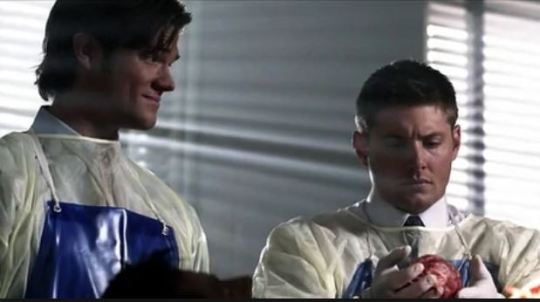
A dude with a wedding ring missing and then his heart is passed to Dean? That looks like symbolism for queer-on-the-side infidelity to me.
We learn all the other vics were also men, and they all died of heart failure (aka, in subtext, we are talking about queer closeted men).
We also learn that Frank’s wife Jessie committed suicide many years ago, and that Frank was a bully in school, but he “got better” after his wife died. Both of these factoids can be read as subtextual signals pointing towards Frank’s queerness (possibly his self-loathing turned outwards and his unhappiness in his marriage).
Then we meet the germaphobe (a mirror for Dean) Sheriff in town. The Sheriff is really cut up about Frank’s death, and seems to be hiding something.
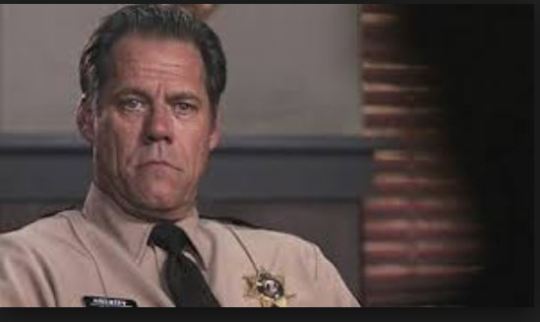
SHERIFF BRITTON: "Me and Frank, we were friends. Hell, we were Game-cocks.”
(Dean snickers)
SHERIFF BRITTON: “That's our softball team's name. They're majestic animals.”
In other words, Dean heard the word “Game-cocks” and his mind immediately went to “fuck buddies,” which says a lot about Dean, but also Dean’s gaydar may have been on-point.
Were the Sheriff and Frank, in fact, (closeted) lovers?
Textually, we find out the Sheriff knew Frank had murdered someone, and covered for him. Subtextually....?
The Sheriff, we realise later, like Dean, has also been “infected” and is beginning to suffer from the ghost sickness. This “infection” as a metaphor for queerness might seem as if it is alluding to HIV/AIDS, but, if we read the queer subtext of the ghost sickness in Yellow Fever as about closeted “gay panic” in the kind of environment where it’s not safe to be out, then this isn’t a “gay/ bi men are infectious” homophobic metaphor, it’s more about closeted men’s fear, in a homophobic environment, that they are somehow “infected” by queerness and will not be able to keep it secret.
And how are the men who have died, “infected”? It seems to be (metaphorically) “through the heart”, as Dean was shown literally holding Frank’s heart, and the Sheriff was suffering from grief-of-the-heart at Frank’s death.
As soon as Dean is drunk, and therefore disinhibited, the element he is is repressing emerges, and Dean flirts with the Sheriff’s cute young assistant. And let’s side-eye the Dean-mirror Sheriff’s choice of deputy eye-candy here. The deputy is framed by a painting of stallions in the Sheriff’s office. Stallions, like game-cocks, being a symbol of hyper-masculine virility - the Sheriff’s choices being both a cover for, and a coded signal of, homoeroticism.
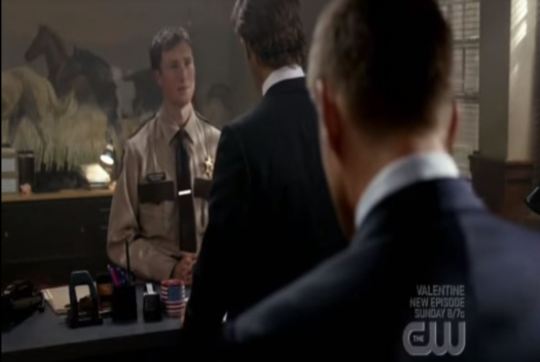
And here’s that much giffed flirting scene:
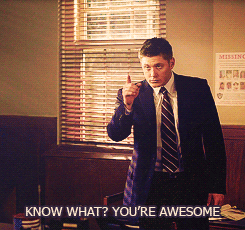
(Couldn’t find the gif credit for this one)
At Frank’s neighbour’s house, Dean (not Sam) gets crawled over by a huge yellow-white python (read - penis metaphor) and Dean (infected by the ghost-sickness, aka “gay panic”) freaks out. As frequently throughout the episode, this subtextual meaning is covered by comedic effect.
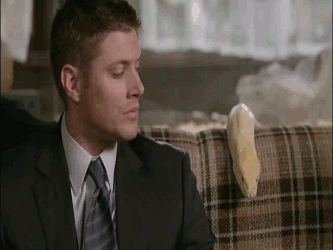
(Couldn’t find the gif credit for this one either - sorry - older gifs tend to appear on platforms like “giphy” that strips out the OP)
Finally, the boys find out that a dude named Luther is the ghostly source of the “ghost-sickness”. Luther, who had learning disabilities, was murdered by Frank, who ostensibly (and wrongly) believed Luther murdered Frank’s wife, Jessie (who had been kind to Luther, and who, Luther’s brother tells the Winchesters, he had a “crush” on).
Is that the actual story, however? That’s the heterosexual, surface-available textual story.
But subtextually? The Winchesters find Frank’s wedding ring in the lumber yard which the ghost of Luther is haunting. What if that disused “lumber yard” was a known cruising ground, and Frank had had sex with men there (symbolised by the loss of his wedding ring) perhaps with Luther himself, or with the Sheriff (and Luther witnessed it) then he felt guilty about it (maybe because Jessie found out about his habit of having closeted sex with men on the side and that contributed to her suicide)? And so, Frank went after Luther.
Why this subtextual reading?
Let’s look at the way Frank killed Luther. He wrapped a chain around his neck and “road-hauled” him to death behind his truck.
Have you heard of a “fag-drag”? Unfortunately, I don’t mean drag performance, but the “queer-bashing” version. You may have heard of a “fag-drag” used in this sense because of this Southpark clip (typically faux-ironic in tone) in which Mr. Garrison yells, “Come on everybody, let’s get us some queers, and some trucks, and have us a good old fashioned fag drag.” Mr. Garrison was depicted as a closted gay man who hid his homosexuality by making homophobic statements in the first three seasons of Southpark (he eventually came out as trans).
youtube
Or, you may have heard of the “fag-drag” (a particular form of homophobic violence) thanks to Brokeback Mountain. It was such a (murderous) “queer bashing” that young Ennis was forced to witness (the aftermath of) by his father - in which an old gay rancher had been roped to the back of a truck and dragged, “...until his dick came off,” and he died.
Sorry for the graphic imagery - none of this is OK and I am using “fag-drag” in quote marks throughout, because it’s obviously a violently homophobic term in and of itself.
So, in subtext, we can read Luther as having been “fag-dragged” to death by a, self-hating, closeted Frank.
As Dean gets pulled further and further into the hallucinations that accompany the ghost sickness, Sam calls Bobby for help.
Bobby realises that the ghost responsible for the “ghost-sickness” is a Buruburu, a ghost born of a person’s fear after dying in a terrifying way. Bobby tells Sam a salt-and-burn won’t work - they have to scare the ghost to death. I mean, logically, that makes no sense, right? A ghost born of terror would surely feed on terror?
But, subtextually, it does make sense, because Sam and Bobby love Dean dearly, but they both, at this stage in the SPN narrative, do not fully understand just how much Dean’s surface macho bravado is a performance, covering much that he hides from them (including his queerness).
So, although they both express distress about it, Bobby and Sam recreate Luther’s original death (in subtext, his homophobic “fag drag”) by wrapping an iron chain round ghost-Luther’s neck and hauling him over the ground, attached to Baby.
Shots of ghost-Luther’s death - Sam calls it a “truck haul” (in subtext, a ”fag-drag”):

are intercut with shots of Dean, in the motel room hallucinating the creepy little girl version of Lilith. He asks her, “Why me? Why’d I get infected?” She tells him, “Silly goose, you know why - listen to your heart.” In subtext - that’s Dean’s queer heart (and see my meta linked above on Dean’s queer heart in 1x12 Faith).
As Luther’s ghost gets “fag-dragged” by Dean’s soul (Baby) Dean’s heart starts to give out (again, the shots of the two events are intercut). In our queer subtext reading, we can understand this as a metaphor for the trauma Dean’s own closeted self (his “gay panic”) is inflicting on his queer heart:

Once Luther’s ghost has been destroyed, the ghost sickness leaves Dean.
Or (metaphorically speaking) does it?
The final scene between Dean, Sam and Bobby is really heartbreaking, in a subtextual sense. Because Bobby and Sam tease Dean about how anxious he was under the spell of the ghost sickness, and he pushes back, full once again of his performance bravado:
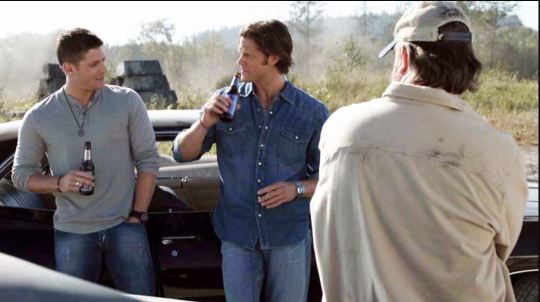
BOBBY: “You sure, Dean? 'Cause this line of work can get awful scary.”
DEAN: “I'm fine. You want to go hunting? I'll hunt. I'll kill anything.”
BOBBY: “Awwww, he's adorable. I got to get out of here. You boys drive safe.”
So, yes, the more textual layers of the narrative tell us that Dean got infected by the ghost sickness not because, as Sam says in the episode, Dean is a “dick” but because Dean’s terror of being dragged back to Hell (and to the things we eventually find out he did there) made him susceptible to fear-infection.
The more textual layers tell us, that the things Dean keeps from Sam in their talk at the hood of the Impala at the end of the episode, are his hallucinations of Hell-hounds, of Lilith, and of Sam himself with yellow eyes.
But in the queer subtext (should we choose to adopt this reading)?
Dean’s “gay panic”, Dean’s fear of homophobic, or homophobic but homo-erotically charged, violence (like that which was visited on Luther by Frank) was what attracted the ghost-sickness to him (and not to Sam) just as it was attracted to the town’s other (closeted) men, like the Sheriff, who, guiltily (and in fear) nevertheless cruised for sex in the abandoned lumber yard, or took part in nights away with their fellow “Game-cocks”.
And so, in this subtextual reading, one of the things Dean is choosing to hide from Sam, is his queerness.
This particular reading of Yellow Fever makes additional sense once we get to 4x16 On the Head of a Pin and discover that Dean’s time in Hell included a, hideous and twisted, but nevertheless homoerotic, charge between himself and his torturer and “mentor” in Hell, the demon Alastair. That’s an additional trauma, an additional psychic wound, for Dean’s queer heart to bear.
Finally, we should also note, that an element that significantly supports this queer reading is the fact that Yellow Fever is set in the fictional town of Rock Ridge, Colorado. That is also the setting for the spoof Western Blazing Saddles (1974). That movie contains the famous “French mistake” sequence (which later gave Edlund the title and concept for 6x15 The French Mistake).
This sequence is where the movie finally breaks the fourth wall (revealing itself to be artifice) and the Western set of Blazing Saddles breaks through into a cabaret chorus show, where an all male troupe are performing a top and tails number called “The French Mistake” (an allusion to men having sex with men). They are called “faggots” and “sissy marys” by the cowboys, but they also “queer” themselves by using feminine pronouns; “Come on girls!” The cowboys and the chorus dancers get involved in a free-for-all punch-up, but we also see some of them making friends with one another, emerging from the melee with their arms around each other.
This is, of course, a meta-commentary on the queer subtext of the Western genre (and the closeted queerness of classic Hollywood itself). So, it’s a pretty interesting setting to have chosen for Yellow Fever (as it points, by allusion, to the queer subtext of Supernatural i.e. it’s a big sign, for those chosing to follow the trail, that looking out for queer subtext in Yellow Fever might bear narrative fruit). Here is the “French Mistake” clip from Blazing Saddles:
youtube
The book Intersecting Film, Music and Queerness by Jack Curtis Dubowsky (Palgrave, 2016) contains a chapter specifically devoted to reading the queerness in Blazing Saddles.
My own reading of Yellow Fever has been brought to you by me, courtesy of Andrew Dabb and Daniel Loflin, who wrote the episode, inspired by some of the questions left hanging in @f-ckyeahfutbol. and @sandraugiga ‘s meta on the episode.
As ever, here is my usual disclaimer - Dean’s bisexuality and his attraction to men continue to be told in the SPN subtext (14 years and counting now). My queer readings of Supernatural do not “promise” that this element of the narrative will emerge into undeniable main-text for the general audience.
However, subtext IS a part of narrative.
#Supernatural#SPN meta#Meta#4x06#Yellow Fever#Dean is bisexual#Still subtext#But subtext IS part of narrative#CW: suicide#CW: violence#CW: homophobic violence
245 notes
·
View notes
Text
OK I know what you’re thinking. Why is the 1533 Buggery Act such a big deal! After all, it’s a piece of Tudor law:
A) that sounds dry AF
B) has nothing to do with me!
Well, if you care about LGBTQ+ rights (or let’s be blunt, basic human rights) than this is a piece of Tudor law that you have to know about!
The 1533 Buggery Act wove a tangled web that stretches throughout history. Beyond those who were caught up in its immediate wake, It’s threads lead us to Oscar Wilde’s imprisonment, Alan Turing’s conviction and the abysmal pit where fundamental rights should be, that the LGBTQ+ community and their allies are still fighting against.
So if that still sounds dry AF, then strap in Donald, because you’re about to get your mind blown.
Seriously we’re getting into world view changing stuff!
The Buggery Act was the brainchild of Henry VIII who had a fun habit of lumbering the UK with laws that came out of him wanting to make a point during a hissy fit…yet inexplicably stuck around for hundreds of years at a major human cost (e.g that time he made it legal to execute someone with severe mental health issues) The 1533 Buggery Act was no exception!
But lets take it back to pre-Henry for a second. Prior to 1533 there were no set laws to persecute homosexuality in England. That’s not to say it wasn’t. In the 13th century two legal codes called for men caught having same sex relationships to be buried alive or burnt, which is horrific!
However, these were suggestions, not actual laws and there is no evidence that these punishments were ever carried out. For the most part, the then frowned upon act was dealt with in the ecclesiastic courts (so basically it was left with god and his earthly servants to deal with either after death or in the realm of the church)
As such, the sudden decision to make homosexuality criminal was a big deal. In fact it was such a big deal that this sharp turn to criminalisation actually had to be addressed in the original statues outlining the 1533 act. Which says that the law was in part created to make homosexuality clearly punishable, saying:
“For as moche as there is not yet sufficient & condigne punishment appointed & limitted by the due course of the lawes of this realme for the detestable & abominable vice of buggeri committed with mankind or beest.”
It goes on to explain the possible punishments for those caught committing ‘buggery’:
“And that the offenders being herof convict by verdicte, confession, or outlaurie, shall suffer suche peynes of dethe, and losses, and penalties of their goodes, cattals, dettes, londes, tenements, and heredytamentes, as felons benne accustomed to do accordynge to the order of the common lawes of this realme. And that no person offendynge in any suche offence, shalbe admitted to his clergye”
Obviously the clear biggy here is ‘pain of death’, but right at the bottom of this portion of transcript there’s the sentence:
‘And that no person offending in such offence shall be admitted to his clergy’ – that right there is the crux of this whole piece of legislation.
Because why create The Buggery Act and criminalise same sex relationships at this particular moment in time?
To persecute the Catholic Church of course!
If you’re thinking , ‘that makes little to no sense’, gold star! It doesn’t… well at least until you break down what was going down in 1533.
You see, until the 1530’s England had been part of the Catholic Church. But, Henry VIII was desperate to break away from the church as it wouldn’t grant him a divorce so he could marry his side chick, Anne Boleyn. So Henry decided to create a new church for England, one that he’d be the head of (and wouldn’t you know it, the head of this new church just happened to be A-ok with divorce).
Sadly creating your own church doesn’t magically erase your countries already existing, centuries old religion overnight. So Henry worked with his right hand man, Thomas Cromwell, to loosen the tight hold Catholicism had on England and for a double win, also siphon it’s money to Henry.
The 1533 Buggery Act was just part of this plan. It was solely designed to take away a little bit of the power away from The Catholic Church, not to actually persecute homosexuality.
And yet this law was about to take its first victim.
By 1540 the Buggery Act had done its job. The Catholic Churches hold on England had been loosened, Henry had married Anne Boleyn (and then had her executed), married again (this time she’d died in childbirth) and was onto marriage number four. Thomas Cromwell had played Cupid for these nuptials, hooking Henry up with his new wife, Anne of Cleves. Sadly Henry wasn’t a fan of his new bride and this was such a big no no that it led to Thomas Cromwell’s death.
But as is probably clear by now, Henry was a petty bitch, and so he made sure that when Thomas went down, he wasn’t going alone.
On the 29 June 1540 Thomas Cromwell was beheaded for treason and his mate, Walter Hungerford, became the first person to be executed under The Buggery Act (among other allegations).
A bloody punishment, with the Buggery Act added as an extra dollop of humiliation for Hungerford and as an additional middle finger to Cromwell who’d helped create the act.*
*side note: before we start feeling really sorry for Walter Hungerford, he was an abusive man who imprisoned his wife to the extent she had to drink her own urine to survive. So you know. Maybe hold the sympathy cards.
Henry VIII
Thomas Cromwell
Ok, that was A LOT to take in. So let’s pause and take a quick moment to look at where we are:
We have a law that was created to criminalise homosexuality BUT was actually used to screw over the Catholic Church
We have a first victim of the law…BUT he was most likely executed not because of the law itself but as an F U to his mate who created the law.
So, we can all agree that thus far, The Buggery Act is a very bloody farce. But that does that mean it’s done?
OF COURSE NOT!
Though the law was repealed by Henry VIII’s daughter, Queen Mary I in 1553 (who wanted power over this to go back to the Catholic Church and it’s ecclesiastic courts), once she died, her successor and sister, Queen Elizabeth I made the Buggery Act law once more.
And from there it started to truly transform into a law for persecution.
Using a Latrice Royale gif to cut the tension, but just a warning: It’s about to get really dark for a bit.
For much of the 15th and 16th centuries arrests and executions under the Buggery Act were few and far between. However, that didn’t happen stop this horrifying law from spreading.
One of the huge issues of The Buggery Act being a law, was that Britons leaving the country took it with them. Take for example those plucky puritans who set sail for the brave new world of America – alongside terrible hats and a smattering of racism, they made sure to also pack legal persecution!
And so the legal execution of people for homosexuality began in a new country. In 1624, Virginia hung Richard Cornish, a ships captain, for ‘forcible sodomy’ of his ships 29 year old cabin boy.
Two years later, Massachusetts hung William Plain on allegations of sodomy that took place in England (so before he even moved to America!).
That same year, the countries New Netherlands colony successfully managed to achieve the discrimination trifecta when they used the Buggery Act to strangle and ‘burn to ashes’, Jan Creoli, a poor black gay man.
If you thought things were bad, they are about to get even worse.
Back in Britain, a more vocal queer community was starting to appear, thanks to the underground popularity of Molly Houses (places where queer men could be free to openly show their sexuality, kind of the great great great grandfather of the small town gay bar). But this emerging light in the dark attracted the worst kind of people and they dedicated themselves to eradicating what they saw as the gay scourge.
One such group was the catchily named, The Society For The Reformation of Manners. Determined to rid London of its LGBT subculture, they worked undercover to infiltrate Molly Houses, gather evidence against its users and then together with the police, raid them.
One such raid was that of Mother Claps house in 1726. Dozens of men were rounded up and arrested, with several fined and pilloried. But that’s not the worst of it.
The Society For The Reformation of Manners successfully helped to leverage the Buggery Act to hang three of the arrested men for the crime of having sex, or as one witness spat out during the trial:
‘Making love to one another as they call’d it’
Example of an execution, like that of the Mother Clap House victims. from the era
During the 1800’s the executions continued. Trials for men accused under The Buggery Act sprung up across England. Some of those found guilty had the relative luck (though the chance of survival still wasn’t great) at instead being transported to Australia, but others weren’t so lucky.
The last men executed under The Buggery Act were James Pratt and John Smith, in 1835.
A husband and father, James Pratt, met with John Smith in August 1935, at an ale house in London for a drink. The pair then got chatting with an older man, William Bonill and went back to his rooms.
William Bonill soon left to get another drink at the pub, leaving James and John alone. It was after this that Bonill’s landlord reported finding the pair having sex.
Neither James Pratt or John Smith stood a chance in court. If you are in any doubt on that front, just read the opening transcript from John Smith’s prosecutor.
‘feloniously, wickedly, diabolically, and against the order of nature, had a venereal affair with one James Pratt, and did then and there, feloniously, wickedly, diabolically, and agains the order of nature, carnally know the said James Pratt, and with him the said James Pratt did then and there feloniously, wickedly, diabolically, and against the order of nature, commit and perpetrate the detestale, horrid, and abominable crime (among Christians not to be named) called buggery, to the great displeasure of Almighty God, to the great scandal of all human kind’
Charles Dickens actually attended Newgate jail, when the men were awaiting sentencing and recalled:
‘Their doom was sealed; no plea could be urged in extenuation of their crime, and they well knew that for them there was no hope in this world.’
He was, of course, right. Of seventeen others sentenced to death at the same time as John and James (for crimes including attempted murder) all had their sentences commuted to transportation to Australia. All expect John Smith and James Pratt.
A huge crowd gathered outside Newgate Jail to watch their deaths.
Watching his (possible) partner, John Smith, being blindfolded and his noose put on, caused James Pratt an understandable level of anguish. He reportedly went physically weak, needing help just to stand and calling out:
‘Oh God, this is horrible. This is indeed horrible.’
Though we don’t have clean cut evidence that the two were in a relationship, it’s hard to read this as anything other than love and the devastation of James knowing what his partner was about to go through.
Which I think summarises the pointlessness and brutality the Buggery Act had on all those who feel under its wake. Of it’s last two victims; two men who just wanted a private moment to be together and died because of that.
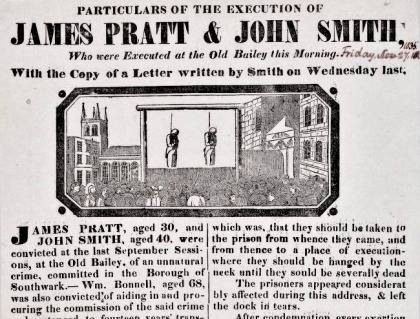
Newspaper from the hanging of James Pratt and John Smith
The Buggery Act remained in place in one form or another until 1861 when the Offences Against The Person Act replaced it.
The new law abolished the death sentence for ‘buggery’, instead punishing those convicted with a prison sentence of up to life. In 1967 the laws around homosexuality as an illegal act were dropped.
All of this, because in 1533 a pissed of King set up a law that he hoped would bring down a religion – the persecution of thousands if not millions, was just secondary.
If you want to read up more on this and other areas of LGBT+ history (and please do!) some great sources are below:
Rictor Norton, for a treasure trove of articles and essays on the history of LGBTQ+ history in England dating back to the medieval era.
The Peter Tatchall Foundation, a human rights charity with an amazing section of history of laws that sought to persecute
The British Library, where you can look at so many of the original documents I mention in this, digitally wherever you are in the world!
Why you have to know about the 1533 Buggery Act OK I know what you’re thinking. Why is the 1533 Buggery Act such a big deal! After all, it’s a piece of Tudor law:
2 notes
·
View notes
Text
A Sweet Friend: Power and Erotics in Doctor Faustus -- A Summary
So, let’s talk male-male relationships in this time, shall we? Hey y’all! I actually am getting around to this now! Now some disclaimers overall: I am an undergrad. I’m not like an expert in any way shape or form. This is just the conclusion I reached in a 9-12 page essay for a 10 week class on renaissance literature. Additionally I feel as though I may have misrepresented the amount of this paper that is explicitly about the use of the word “sweet.” It is an important part of my paper because it complicates the topic in a weird way. I am in no way done with this paper, it’s something I want to continue to research, refine my thesis, and eventually maybe get this shit published. But for now, I’ll talk about the stuff that I have done. Probably gonna put this under a cut because this could get aggressively long.
My main topic was to determine the power dynamic between Faustus and Mephistopheles through a lens of the erotic. We’d spent the whole term looking at how the Elizabethans were actually pretty into having power over others, thus the erotics of a young boy’s body on stage (there’s lots of shit with this). So I thought, well if we can identify erotic elements of a relationship based on the difference in power, we should be able to go the other way, and determine a power dynamic based on the erotic elements.
I started this paper going there is clearly something going on between Mephistopheles and Faustus, right?? Like surely there will be no shortage of scholarship identifying the homoerotic language in this play... RIGHT? Well as it turns out it was actually difficult to find scholarship on the erotics in this play specifically. Weird. So I had to turn to more general topics-- how do men show affection to each other normally in this period? By determining the norm, and attempting to quantify how the relationship between Mephistopheles and Faustus does or does not fit within it, I could study the queer qualities in their relationship, and hopefully from this I could determine who holds the power between the two of them.
So, let’s talk male-male relationships in this time, shall we? I relied heavily on the works of Alan Bray in this particular regard. He wrote an article titled “Homosexuality and the Signs of Male Friendship in Elizabethan England” in around 1990 that summarizes what he considers to be the normal relationship between two gentlemen of equal or very similar rank. An important detail: this relationship that I am about to summarize is not in fact queer because it was a perfectly normal relationship. That’s not to say they are not gay as hell (pun not intended). As we define relationships now, this absolutely would constitute a gay relationship so please don’t panic as I continue to use the term “gentleman’s friendship.” I am with you all. I just want to point out the weird intricacy of this relationship. It was not considered sodomy to the Elizabethans, and they didn’t have the identity concept of homosexuality we have. It doesn’t mean we are trying to erase the queer aspects in any way, it just means we need to deal with it slightly differently (one reason I put off writing this so long is I’m very afraid people will be like ‘you promised us gay code and now you’re just calling them friends’). That said, Bray outlines two very important features of a friendship between two gentlemen: an outwardly-directed physical relationship, and an inwardly-directed emotional bond.
Let’s break that shit down now. What do I mean when I say outwardly-directed physical aspects? Bray explains that these relationships included public displays of affection. Gentlemen could embrace in public, kiss in public, and in fact share a bed with each other. While the bed-sharing would not be public in itself (they weren’t like hey look watch us sleep!), people would make it very clear who they were sharing a bed with and people would know they were “bedfellows” (Bray 4). This public side of the relationship was incredibly important because these relationships between gentlemen of rank were often power plays in themselves. Everyone wants someone to cuddle and smooch, but at this point in time two gentlemen could essentially protect each other’s rank by showing their bond. Same concept as having powerful friends to my understanding. You have someone to call on if someone wrongs you, who will undoubtedly be on your side. Looking at the public aspects of this, it opens our options for finding examples of this relationship in Faustus a little bit more--rather than just looking for examples of them kissing or embracing (relatively scarce seeing as no stage direction like ever)-- we can look for examples of favors between them (literally everything that happens).
That said, there are some very real places that we do see evidence of Faustus and Mephistopheles sharing a bed. Take for example when Faustus and Mephistopheles visit Rome, Meph has this lovely little present for Faustus:
...and because we will not be unprovided, I have taken up His Holiness’ privy chamber for our use.
(3.1.843-845)
Now ok so a privy-chamber isn’t exactly a bedroom, though some privy chambers may in fact have had a bed, the intimacy of sharing that space remains. So is this in fact an implication that Faustus and Mephistopheles would share a bed there, perhaps even with the Pope (ok but a threesome with the Pope and a literal devil?? Marlowe buddy)? Another piece of evidence for Mephistopheles and Faustus sharing a bed is that right at the end of his life, Faustus confesses to some fellow scholars, crying to one:
Ah, my sweet chamber fellow! Had I lived with thee, then had I lived still, but now I die eternally!
(5.2.1390-1391)
So maybe Faustus and this scholar used to be close and share a bed, but they no longer do. Why? Most likely because Faustus has been bedding down with somebody else recently. Also note Faustus’ use of the word die there, because it has one of my favorite double meanings. “Die” was at this point very much a slang word for orgasm. Amazing Faustus super subtle bro. (I mean to be fair he likely means his actual impending damnation here, but also Marlowe most certainly chuckled as he wrote that shit, and it is still significant that elements of their relationship are coded as erotic).
And I’m not gonna get into the specific favors that I covered in my paper because this is already super long and I haven’t even touched sweetness yet. But idea being, go through the play if you’d like and note all the favors Mephistopheles does for Faustus. You can argue that Faustus “owns” Mephistopheles and thus Mephistopheles has to follow his orders, but I think the next section may complicate that understanding.
OK NOW WHAT MOST OF YOU ACTUALLY WANTED: “sweet.”
The source you should all start with for interest in the use of this word is Jeffrey Masten’s “Toward a Queer Address: The Taste of Letters and Early Modern Male Friendship.” It is incredibly interesting, and covers what Masten discovers to be “a rhetoric of sweetness between men” (Queer Address 370). First of all, what a fucking great way to put that. he examines the use of “sweet” between Valentine and Proteus and Hamlet and Horatio (”Goodnight, sweet prince” anyone? literally kill me it’s so good). So maybe it wasn’t “queer code” then because that relationship was normal but it sure as hell points to a queer relationship in modern view. Now looking at Faustus, this play is absolutely fucking littered with the word “sweet.”
Now the angle I used from this article was actually Masten’s examination of the etymology of “sweet” as coming from the word meaning “to persuade” and therefore its use in persuasion between men (think “my good sweet honey lord” Poins turning on that charm to get Hal to play along). But remember how I said the play is littered with sweetness? The thing that struck me when I was looking more into it is that I could not find one example of Mephistopheles addressing Faustus as sweet. Ever. Maybe I missed one but I don’t think I did. So in an equal relationship, Faustus and Mephistopheles ought to share this rhetoric equitably right? So what is up with this why does Faustus call Meph sweet all over the damn place and Meph never reciprocates?? Like honestly what a dick move Meph. This is where my thesis comes in (and I will reiterate, I’m not fully sold on this thesis myself) -- their relationship is not equal. The power truly rests in Mephistopheles’ hands; however, Mephistopheles is clever and knows he cannot let the proud Faustus realize this. So, Mephistopheles allows their relationship to become framed as a gentleman’s friendship in order to rhetorically dominate Faustus.
I ended up looking specifically at the situations in which Faustus uses “sweet” and it is most often at times when Mephistopheles has appeared unwilling to follow his order. Take for example when Faustus asks Mephistopheles to bring him a wife
Faustus. …let me have a wife, the fairest maid in Germany, for I am wanton and lascivious, and cannot live without a wife.
Mephastophilis. How? A wife! I prithee, Faustus, talk not of a wife.
Faustus. Nay, sweet Mephastophilis, fetch me one, for I will have one.
(2.1.587-592)
Mephistopheles immediately denies Faustus’ request, and this drives Faustus to flex his persuasive rhetoric with his use of “sweet Mephistophilis.”
Basically this is where my paper fell apart in my opinion. I don’t think my thesis is necessarily wrong, but it does not cover the intricacies of their relationship. I also am unsatisfied because I essentially draw the conclusion that Mephistopheles only ever is doing his job to drag Faustus to hell and never becomes really close to him, which I just don’t think is true. It bugs me to no end that Mephistopheles never uses the word “sweet” in reference to Faustus. So I’m still examining the text, looking for new sources, I may dip into the B-text a little bit sometime because I used only the A-text for this because it is the one more accepted as “accurate.”
I hope this interested some of you, I’ll include my whole bibliography that I used for this paper (lots of it was not covered in this summary, and also several things didn’t even make it into my paper because I hit 12 pages very fast). There were a couple more relationships I wanted to examine the erotics of, but I really only got to talk about 2 of them in my full paper.
Thanks for your interest though y’all! I’m very proud of this work, even though it has a very very long way to go and I’d be interested to hear thoughts on this one.
Bibliography:
Barrie, Robert. “Elizabethan Play-boys in the Adult London Companies”. Studies in English Literature, 1500-1900 48.2 (2008): 237–257. Web.
Bray, Alan. "Homosexuality and the Signs of Male Friendship in Elizabethan England." History Workshop 29 (1990): 1-19. Web.
Cox, John D.. “Devils and Power in Marlowe and Shakespeare”. The Yearbook of English Studies 23 (1993): 46–64. Web.
"die, v.1." OED Online. Oxford University Press, March 2016. Web. 29 May 2016.
"familiar, n., adj., and adv." OED Online. Oxford University Press, March 2016. Web. 29 May 2016.
Goldberg, Jonathan. Sodometries: Renaissance Texts, Modern Sexualities. Stanford: Stanford University Press, 1992. Print.
Masten, Jeffrey. “Between Gentlemen: Homoeroticism, Collaboration, and the Discourse of Friendship.” Textual Intercourse: Collaboration, Authorship, and Sexualities in Renaissance Drama. Ed. Stephen Orgel. Cambridge: Cambridge University Press, 1997. 28-62. Print.
---. "Toward a Queer Address: The Taste of Letters and Early Modern Male Friendship." GLQ: A Journal of Lesbian and Gay Studies 10.3 (2004): 367-384. Project MUSE. Web. 29 May. 2016. <https://muse.jhu.edu/>.
"ravished, adj." OED Online. Oxford University Press, March 2016. Web. 29 May 2016.
Richmond, Velma Bourgeois. “Renaissance Sexuality and Marlowe’s Women.” Forum. 16.4 (1975): 36-44. Electronic.
Smith, Bruce R. Homosexual Desire in Shakespeare’s England: A Cultural Poetics. Chicago: The University of Chicago Press, 1991. Print.
Stockholder, Kay. “‘Within the massy entrails of the earth’: Faustus’s Relation to Women.” “A Poet and a filthy Play-maker”: New Essays on Christopher Marlowe. Ed. Kenneth Friedenreich, Roma Gill, and Constance B. Kuriyama. New York: AMS Press, 1988. 203-219. Print.
Weil, Judith. “‘Full Possession’: Service and Slavery in Doctor Faustus.” Marlowe, History, and Sexuality: New Critical Essays on Christopher Marlowe. Ed. Paul Whitfield White. New York: AMS Press, 1998. 143-154. Print.
#Doctor Faustus#queer studies#elizabethan literature#christopher marlowe#my work#scholarship#long post#so horrendously long#this took me like 2 hours to write#the paper is stupid long#and this isn't even based on the full paper right now because my copy of my very full paper was not on my computer for some reason#this is based on the shortened version I did for the conference I went to
395 notes
·
View notes